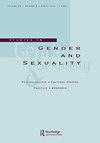不可思议的滑动驱动:约会软件算法思维的种族主义模式的回归
Q3 Social Sciences
引用次数: 6
摘要
随着算法媒体放大长期存在的社会压迫,它们也试图殖民社会中每一个可以抵抗压迫的地方。刷屏应用就是这种动态的典型例子。通过采用促进心不在焉参与的协议,他们允许无意识的种族偏好表达,而不会打扰用户认为自己是非种族主义者。然后,这些偏好被推荐系统衡量,该系统将“吸引力”视为零和游戏,根据这些游戏的赢家和输家分配情感流,并最终放大种族作为成功寻找亲密关系的一个因素的重要性。在引导用户将自己的行为与令人不安的网络效应分离的过程中,刷屏应用递归地将他们的无意识偏见与有偏见的结果结合在一起,形成了一个有害的反馈循环。为了抵制这种个人与网络的意识形态割裂,本文通过“不可思议的用户无意识”的视角分析了50位在线约会者的访谈。这个镜头允许对令人厌恶的分布式思维模式进行情感登记,这些模式被创造它们的用户所否认,并与之结合。因此,它可能会让那些寻求更合乎道德的参与协议的人,在某些算法放大和抑制的过于熟悉的偏见上得到一些支持。本文章由计算机程序翻译,如有差异,请以英文原文为准。
The Uncanny Swipe Drive: The Return of a Racist Mode of Algorithmic Thought on Dating Apps
ABSTRACT As algorithmic media amplify long-standing social oppression, they also seek to colonize every last bit of sociality where that oppression could be resisted. Swipe apps constitute prototypical examples of this dynamic. By employing protocols that foster absentminded engagement, they allow unconscious racial preferences to be expressed without troubling users’ perceptions of themselves as nonracist. These preferences are then measured by recommender systems that treat “attractiveness” as a zero-sum game, allocate affective flows according to the winners and losers of those games, and ultimately amplify the salience of race as a factor of success for finding intimacy. In thus priming users to disassociate their behaviors from troubling networked effects, swipe apps recursively couple their unconscious biases with biased outcomes in a pernicious feedback loop. To resist this ideological severing of the personal from the networked, this article analyzes interviews from 50 online daters through a lens formulated as the “uncanny user unconscious.” This lens allows for the affective registration of abhorrent modes of distributed thoughts disavowed by the very users they are created from and coupled with. It may thus afford those seeking more ethical protocols of engagement some purchase on the all too familiar biases some algorithms both amplify and repress.
求助全文
通过发布文献求助,成功后即可免费获取论文全文。
去求助
来源期刊

Studies in Gender and Sexuality
Social Sciences-Gender Studies
CiteScore
0.80
自引率
0.00%
发文量
15
期刊介绍:
Beginning in the final two decades of the 20th century, the study of gender and sexuality has been revived from a variety of directions: the traditions of feminist scholarship, postclassical and postmodern psychoanalytic theory, developmental research, and cultural studies have all contributed to renewed fascination with those powerfully formative aspects of subjectivity that fall within the rubric of "gender" and "sexuality." Clinicians, for their part, have returned to gender and sexuality with heightened sensitivity to the role of these constructs in the treatment situation, including the richly variegated ways in which assumptions about gender and sexuality enter into our understandings of "normality" and "pathology."
 求助内容:
求助内容: 应助结果提醒方式:
应助结果提醒方式:


